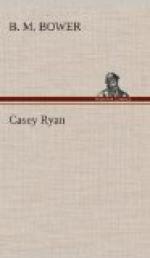But daylight found him still below the higher slope of the ridge, and Casey was very tired. He had been walking all day, remember, and he had missed his supper because he wanted to eat it with the lake behind him. He did not walk in a straight line. He was too near exhaustion to forge ahead as was his custom. Now he was picking his way carefully so as to shun the washes out of which he must climb, and the rock patches where he would stumble, and the thick brush that would claw at him. He would have given five dollars for a drink of water, but there would be water at the car, he told himself. People were rather particular about carrying plenty of water when they traveled these wastes.
And then he was on the ridge, and his keen eyes were squinted half-shut while he gazed here and there, no foot of exposed land surface escaping that unwinking stare. He took off his hat and wiped his face, and reached mechanically for a chew of tobacco which he always took when perplexed, as if it stimulated thought.
There was no car. There was no road. There was not even a burro trail along that ridge. Yet there had been the lights of a car, and after the lights had been extinguished Casey had listened rather anxiously for sound of the motor and had heard nothing at all. The most powerful, silent-running car on the market would have made some noise in traveling through that sand and up and down the washes that seamed the mountain side. Casey would have heard it—he had remarkably keen hearing.
“And that’s darn funny,” he muttered, when he was perfectly sure that there was no car, that there could never have been a car on that trackless ridge. “That’s mighty damn funny! You can ask anybody.”
CHAPTER XIV
Other things, however, were not so funny to Casey as he stood staring down over the vast emptiness. There was no sign of his pack train, and without it he would be in sorry case indeed. He thought of the manner in which the tornado had whirled him round and round. Caught in a different set of gyrations and then borne out from the center—flung out would come nearer it—the burros and William might have been carried in any direction save his own. Into that gruesome Crevice, for instance. They had not been more than a mile from the Crevice when the storm struck.
He glanced across to Barren Butte, rising steeply from the farther end of the lake. But he did not think of going to the mine up there, except to tell himself that he’d rot on the desert before he ever asked there for help. He had his reasons, you remember. A man like Casey can face humiliation from men much easier than he can face a woman who had misjudged him and scorned him. Unless, of course, he has a million dollars in his pocket and knows that she knows it.
Having discarded Barren Butte from his plans—rather, having declined to consider it at all—he knew that he must find his supplies, or he must find water somewhere in the Crazy Woman hills. The prospect was not bright, for he had never heard any one mention water there.




